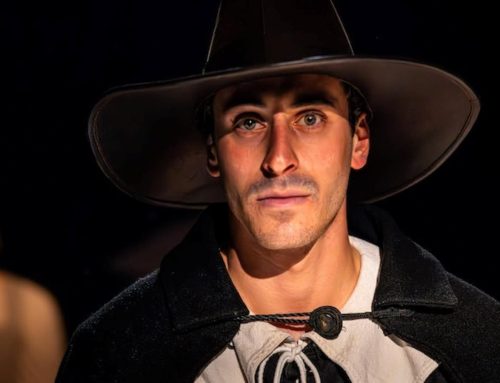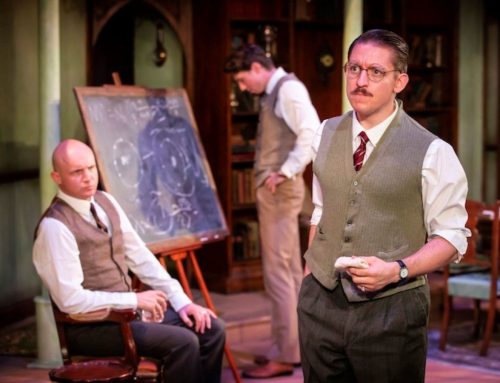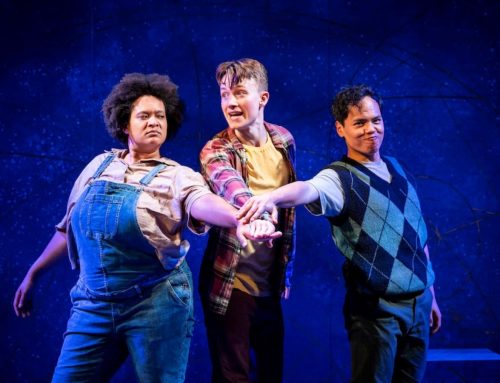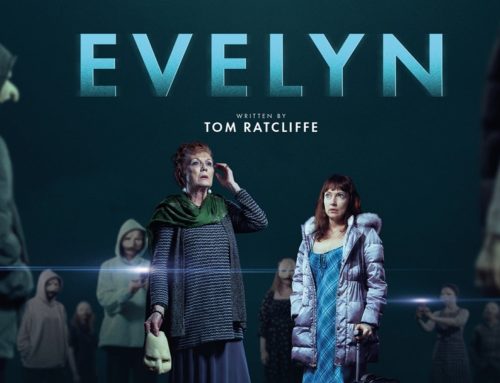Chekhov’s short stories have much in common with his plays. Unhappy characters live mundane lives enveloped in a kind of laconic and lyrical sadness. Not much happens but there are infidelities, conflict, and subtext to be enjoyed. Comedy is there too but mostly subtle and ironic. They are ripe for dramatization or so one would suppose. In In and Out Of Chekhov’s Shorts writer and director Eliot Giuralarocca adapts five of the author’s tales into a loosely connected piece of storytelling delivered by a travelling ensemble of singing, dancing, wise-cracking Russian gypsies. Aside from misery, loneliness, and dissatisfaction with life, not much connects the sagas. An attempt at establishing a cohesive arc in which characters appear in one story and then reappear in others confuses rather than elucidates. The result is a concoction that is fun in its way, aided by agreeable original music from Tom Neill and hit or miss fringe-style comedy. But Uncle Vanya it ain’t.
The subtler and much better first half kicks off with The Chemist’s Wife. The titular character, played by an engagingly winsome Elisabeth Snegir, passes a sleepless night listening to the snores of her unloved and unlovable husband in the bedroom above. “God how unhappy I am, and nobody knows” she tells us. It is a statement that holds true for most of the characters we get to meet over the course of the over-long evening. Things look up when two army officers (Graeme Dalling and Chris Agha) pass by the shop at dawn, ostensibly to buy peppermints but really to admire the woman’s looks. The three enjoy wine, a song, a dance, and a little flirtation. For the briefest of moments her mood lifts. But can it last?
At A Summer Villa sees the unhappily married Pavel (Chris Agha again) receive an anonymous love-letter inviting his attendance at a tryst in a secluded orchard. Initially scornful, then perplexed, and then intrigued, he decides to see what it is all about. He gets an unexpected surprise and a sharp lesson in life from his crafty wife (Verity Bajoria). Giuralarocca’s adaptation throughout sticks closely to his source material, combining dialogue and narration with stream-of-conscious style monologues. The transition from page to stage can occasionally feel clunky; “eight long years of irreproachable duty is positively vexatious” Pavel tells us in one particularly dense dose of inner meditation.
The Lady with the Dog describes an adulterous affair between an unhappily married Moscow banker (“I find by wife rather dull” he says by way of excusing his multiple infidelities) and a young married woman (Snegir again) that begins while both are on holiday alone. Vladimir Nabokov describes it as one of greatest short stories ever written and here it is the highlight of the evening. Smitten and in love, the banker (Giuralarocca performs as well as writing and directing) follows his inamorata to her hometown and engineers an encounter at a theatre. Will the duo find true happiness late in life or remain “living in separate cages”?
The satisfying if patchy first half gives way to a second that eschews ironic subtlety in favour of ribald comedy: Russian realism reimagined as French farce. Anticipate double-entendres, prop malfunctions, mime, and avuncular physical comedy. Think Carry On Chekhov, or perhaps The Chekhov Play That Goes Wrong, and you will get the gist. Fans of fringe comedy, of whom there were many in the press night, will appreciate it. Other might feel it just a tad over-egged. In An Avenger we see the furious Sigaev visit a gun shop in search of a pistol with which to take vengeance on an unfaithful wife and her lover. Will Chekhov’s gun get used? In The Bear we see the widow Elena whose “unfair, cruel and unfaithful husband” has left her heavily in debt. A visit from a neighbouring farmer and creditor opens up the possibility of a new life, if only the duo can overcome the need to fight a duel first.
Giuralarocca has coaxed a solid set of performances from the ensemble, although the highlight is undoubtedly Graeme Dalling’s greedy gun salesman determined to upsell his customer to the most expensive pistol in the shop. Bajoria plays a mean keyboards. Dalling on the clarinet and Snegir on the flute impress too. Victoria Spearing’s set brings an agreeable slice of rural gypsy living to the stage.
Writer and Director: Eliot Giuralarocca
More Recent Reviews
Playfight. Soho Theatre.
Writer Julia Grogan’s breathtakingly assured debut play arrives at Soho Theatre following stellar reviews at the Edinburgh Fringe and [...]
All The Happy Things. Soho Theatre.
Naomi Denny’s three-hander comedy-drama All The Happy Things covers familiar themes within a recognisable premise. A grieving protagonist comes [...]
Telly. Bread and Roses Theatre.
The challenge with absurdist comedy is that many people do not find it funny. Laughing at the sheer weirdness [...]






